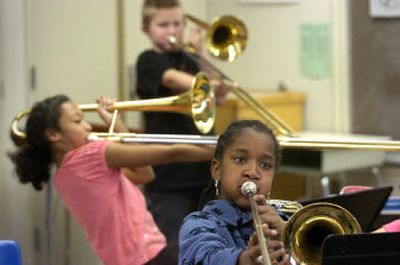No tuba left behind

Fifth-graders in Tamera Knapp’s band class at Holmes Elementary School only know three notes so far.
“We are moving a little slower than we usually do,” said Knapp.
With more students, Knapp doesn’t want any musician getting left behind.
Spokane Public Schools is piloting a new music program in nine elementary schools, including Holmes, over the next two years which eventually will require all fifth- and sixth-grade students to take band or strings. This year, all fifth-graders are playing an instrument.
The program means fifth- and sixth-graders will have to choose between band and strings, either of which is an hour a week. It replaces regular developmental music classes that every student gets for a half-hour, one day a week.
In the past, students who voluntarily took band or strings were pulled out of the classroom an hour each week, as well as a for development music classes.
“This gives every student a little more music at that level,” said Dave Weatherred, the district fine arts coordinator. It also gives teachers one more prep period a day, he said.
At three larger elementary schools, including Hutton, Whitman and Moran Prairie elementary schools, students can also choose a regular music class, but can’t take band or strings if they do. The other schools involved in the pilot are Adams, Franklin, Wilson, Lidgerwood, Linwood and Wilson.
Students in grades kindergarten through four still get developmental music classes. Choir is also still offered at most of Spokane’s 34 elementary schools.
“Many of the kids wanted to take band and strings anyway,” Weatherred said. “At schools where we normally wouldn’t have this many kids taking band and strings we see a real difference.”
District officials say the new program is a cost-saving measure. By doing away with one music class a week in most schools, the program saves about one full-time teacher’s salary.
But the district also had to spend money up front, purchasing about 300 new instruments at a cost of about $40,000.
Students who can purchase instruments on their own are asked to. Those who can’t are required to pay a $20 fee to be able to take a district instrument home. They can still use the instruments for free at school. In the past students who qualify for free- or reduced-price lunch would have been able to take the instruments home for free.
“We had to spend our savings,” to get more instruments, Weatherred, said. It will likely be the same next year, as sixth-graders are added to the program, and possibly additional schools.
While the program eventually means that every student has access to an instrument, Weatherred said the strings concert at the Spokane Arena that was canceled last year is also not included in this year’s budget. The concert, which features about 2,000 students, ended up being funded last year by private businesses.
The program is one of the most popular events for the elementary music program.
“It only happened because of the generosity of the community,” Weatherred said. “We are already looking at that problem again this year.”
“Our district has been committed in spending money in the arts,” Weatherred added. But we need to look at cost savings and how to do that without decimating the program.”